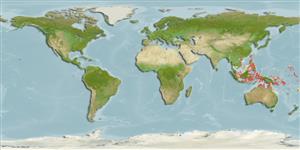Common names from other countries
Environment: milieu / climate zone / depth range / distribution range
Ökologie
seewasser riff-verbunden; tiefenbereich 0 - 5 m (Ref. 90102). Tropical
Western Central Pacific: Australia, Indonesia, Philippines.
Size / Gewicht / Alter
Maturity: Lm ? range ? - ? cm
Max length : 5.5 cm TL Männchen/unbestimmt; (Ref. 36661)
Kurzbeschreibung
Morphologie | Morphometrie
Rückenflossenstacheln (insgesamt): 12; Rückenflossenweichstrahlen (insgesamt): 17-18; Afterflossenstacheln 2; Afterflossenweichstrahlen: 19. Body coloration with 8 pairs of irregular, olive-brown bars and numerous small white spots (particularly on anterior half), breast with large white spot (no defined dark margin), and 2 large dark spots on throat. Segmented caudal rays, 13, with middle 9 branched; supraorbital tentacle with slender base, tip bifid with secondary branches; palmate nape cirrus; nasal cirrus, simple lanceolate filament; upper and lower lip margins smooth; lacking an occipital crest; last anal ray and caudal peduncle connected by membrane; body depth at anal-fin origin 4.6-5.5 in SL (Ref. 90102).
Facultative air-breathing (Ref. 126274); Adults are found solitary on corals both live and dead ones (Ref. 90102). They graze on epilithic algae along with the accompanying detritus and sediment (Ref. 94105). Oviparous. Eggs are demersal and adhesive (Ref. 205), and are attached to the substrate via a filamentous, adhesive pad or pedestal (Ref. 94114). Larvae are planktonic, often found in shallow, coastal waters (Ref. 94114).
Life cycle and mating behavior
Geschlechtsreife | Fortpflanzung | Ablaichen | Eier | Fecundity | Larven
Oviparous, distinct pairing (Ref. 205).
Allen, G.R., 1997. The marine fishes of tropical Australia and south-east Asia. Western Australian Museum, Perth, Western Australia. 292 p. (Ref. 36661)
IUCN Rote Liste Status (Ref. 130435)
CITES (Ref. 128078)
Not Evaluated
Bedrohung für Menschen
Harmless
Nutzung durch Menschen
Mehr Information
ReferenzenAquakulturAquakultur ProfilZuchtlinienGenetikElectrophoresesVererbbarkeitKrankheitenVerarbeitungMass conversion
PartnerBilderStamps, Coins Misc.LauteCiguateraGeschwindigkeitSchwimmstilKiemenoberflächeOtolithsGehirngrößeSehfähigkeit
Tools
Zusatzinformationen
Download XML
Internet Quellen
Estimates based on models
Preferred temperature (Ref.
115969): 26 - 29.3, mean 28.7 (based on 1621 cells).
Phylogenetic diversity index (Ref.
82804): PD
50 = 0.5001 [Uniqueness, from 0.5 = low to 2.0 = high].
Bayesian length-weight: a=0.00741 (0.00335 - 0.01640), b=3.02 (2.83 - 3.21), in cm Total Length, based on LWR estimates for this (Sub)family-body shape (Ref.
93245).
Trophic level (Ref.
69278): 2.0 ±0.00 se; based on food items.
Widerstandsfähigkeit (Ref.
120179): hoch, Verdopplung der Population dauert weniger als 15 Monate. (Preliminary K or Fecundity.).
Fishing Vulnerability (Ref.
59153): Low vulnerability (10 of 100).
